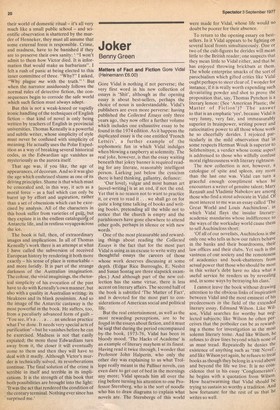Joker
Benny Green
Matters of Fact and Fiction Gore Vidal (Heinemann £6.00) Gore Vidal is nothing if not perverse; the very first word in his new collection of essays is 'Shit', although as the opening essay is about best-sellers, perhaps the choice of noun is understandable. Vidal's publishers are even more perverse: having published the Collected Essays only three years ago, they now offer a further volume which includes one exhaustive essay to be found in the 1974 edition. As it happens the duplicated essay is the one entitled 'French Letters', a further example of the sophomoric fun in which Vidal indulges when blowing a raspberry at solemnity. The real joke, however, is that the essay waiting beneath that jokey banner is required reading for any literate, reasonably intelligent person. Lurking just below the cynicism there is hard thinking, gallantry, defiance: 'Our lovely vulgar and most human art [novel-writing] is at an end, if not the end. Yet that is no reason not to want to practice it, or even to read it. . . we shall go on for quite a long time talking of books and writing books, pretending all the while not to notice that the church is empty and the parishioners have gone elsewhere to attend other gods, perhaps in silence or with new words.'
One of the most pleasurable and rewarding things about reading the Collected Essays is the fact that for the most part Vidal is using as an excuse to write witty and thoughtful essays the careers of those whose work deserves discussing at some depth. (Edgar Rice Burroughs, E. Nesbit and Susan Sontag are three slapstick examples.) And although part of the new collection has the same virtue, there is less accent on literary affairs. The second half of the book is subtitled 'The Matter of Fact', and is devoted for the most part to considerations of American social and political life.
But the real entertainment, as well as the most rewarding perceptions, are to be found in the essays about fiction, and it must be sai,c1 that during the period encompassed by-the book, 1973-76, Vidal has been in bloody mood. 'The Hacks of Academe' is an example of literary mayhem at its finest. Having read it twice through. I wonder that Professor John Halperin, who only the other day was explaining to us what Trollope really meant in the Palliser novels, can even dare to get out of bed in the mornings any more; Vidal spreads him all over the ring before turning his attention to one Professor-Sternberg, who is the sort of noodle who has to draw diagrams to explain what novels are. The Sternbergs of this world were made for Vidal, whose life would no doubt be poorer for their absence.
To return to the opening essary on bestsellers. In it Vidal appears to be fighting on several local fronts simultaneously. One or two of the cult-figures he derides will mean little to the British reader; one suspects that they mean little to Vidal either, and that he has enjoyed throwing brickbats at them. The whole enterprise smacks of the sort of parochialism which gifted critics like Vidal ought perhaps to steer clear of. I wonder for instance, if it is really worth expending such devastating powder and shot to prove the proposition that, say, Thomas Pynchon is a literary lemon. (See 'American Plastic; the . Matter of Fiction')? The answer to that is an emphatic 'yes', because Vidal is very funny, very fair, and immeasurably superior in brainpower, writing power and ratiocinative power to all those whose work he so cheerfully derides. I rejoiced particularly in the mild observation that In some respects Herman Wouk is superior to Solzhenitsyn, a verdict whose comic aspect is addressed to those who wilfully confuse moral righteousness with literary rightness.
The new collection is not, however, a catologue of spite and spleen, any more than the last one was. Vidal can turn a graceful enough compliment when he encounters a writer of genuine talent; Mary Renault and Vladimir Nabokov are among those who find a stout advocate in Vidal. Of most interest to me was an essay called 'The Great World and Louis Auchincloss', ifl which Vidal flays the insular literaryacademic mandarins whose indifference to the ways of the workaday world cause them to sell Auchincloss short; 'Of all of our novelists, Auchincloss is the only one who tells us how our rulers behave in the banks and their boardrooms, their law offices and their clubs. Yet such is the vastness of our society and the remoteness of academics and book-chatterers from actual power that those who should be most in this writer's debt have no idea what a useful service he renders us by revealing and, in some ways by betraying his class.'
I cannot leave the book without drawing attention to the obvious links of inspiration between Vidal and the most eminent of his predecessors in the field of the extended literary essay, Edmund Wilson. Like Wilson, Vidal searches for worthy but neglected subjects; like Wilson he often perceives that the potboiler can be as rewarding a theme for investigation as the most solemn literary tome. And like Wilson, he refuses to draw lines beyond which none of us must tread. Repeatedly he denies the existence of anything such as 'THE Novel, and like Wilson yet again, he refuses to treat books as though they belong in a void above and beyond the life we live. It is no coincidence that in his essay 'Conglomerates he begins with a quotation from Wilson. How heartwarming that Vidal should be trying to sustain so worthy a tradition. And how fortunate for the rest of us that he writes so well.






























 Previous page
Previous page